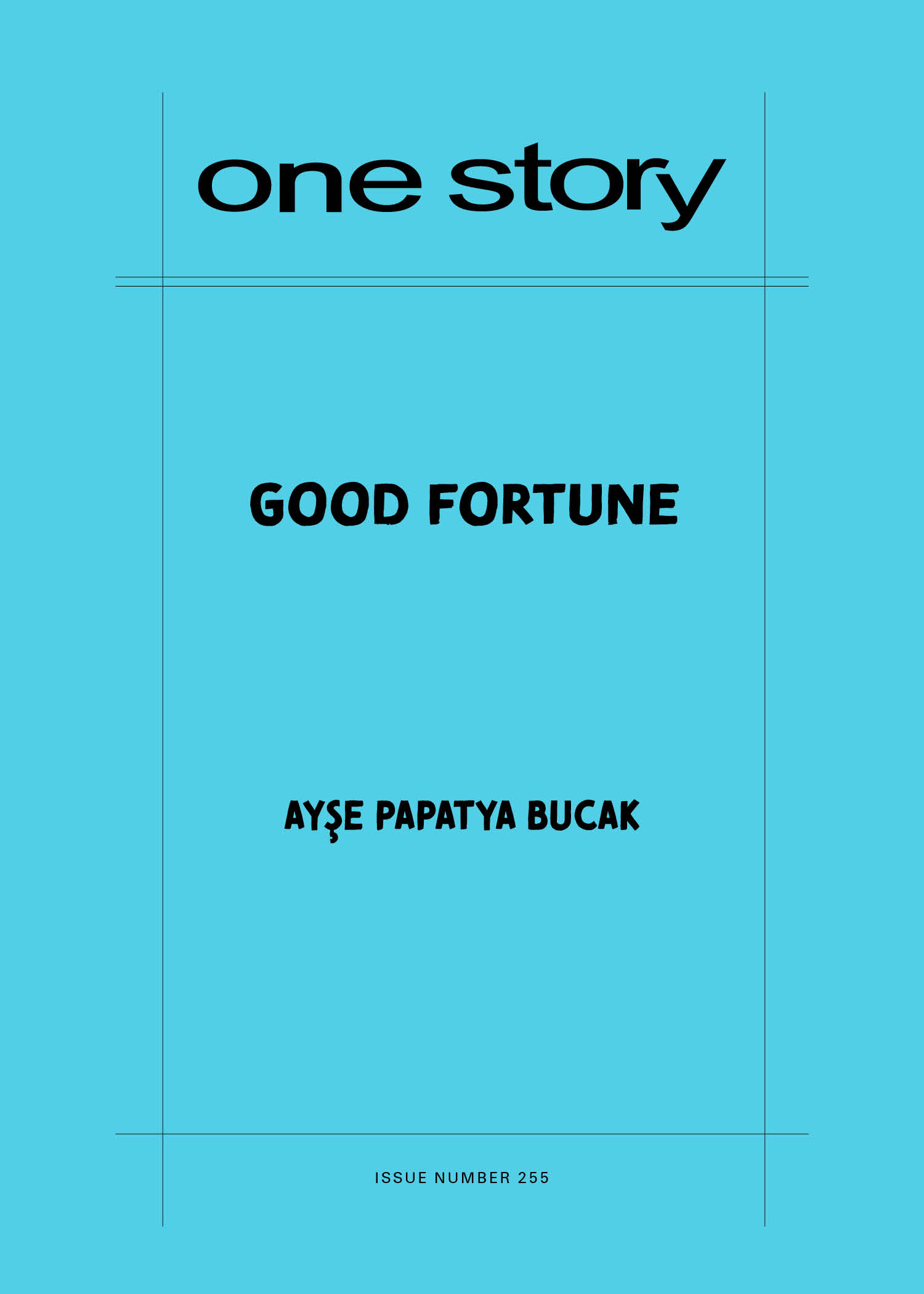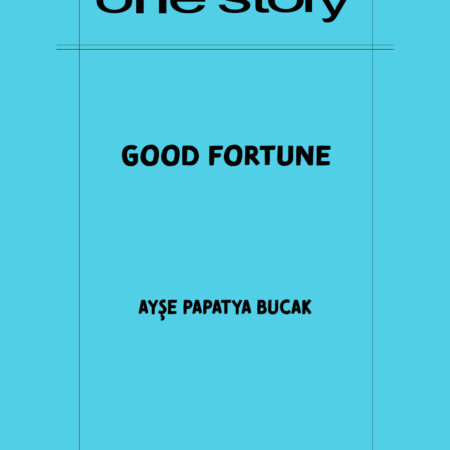
Good Fortune
$2.50
252 in stock
Excerpt
When the first note was found, Gudrun Tabak took it too seriously. The police came, the hotel owners were notified, the hotel guests warned, and Gudrun slept with her vegetable knife in her fist every night, just in case.
The hotel, located some sixty miles north of Miami along the Atlantic coast, catered especially, though not solely, to birth tourists—foreigners who appreciated the U.S. Constitution enough to know that the Fourteenth Amendment granted any child born in the United States American citizenship. These were no crawled-under-the-fence-and-over-the-border immigrants sacrificing themselves for second-generation children; they were wealthy parents who wanted dual citizen babies and could afford to spend months at a luxury hotel in South Florida, paying the full cost of hospitalization and so on. It was Gudrun’s job to make sure these guests, who represented a small portion of the hotel’s population but a significant percent of its profit, were satisfied.
Each day Gudrun dressed in an unofficial uniform, white shirt and black pants, lived with her phone clipped to her belt, and kept no boundary between her life and her work. Some days, after too many complaints—too few babysitters, too much gluten, Florida was too hot and too wet—she would find a corner, close her eyes, and think: white shirt black pants, white shirt black pants to calm herself. But most days she went from want to want without complaint: problem solved problem solved problem solved.
Ayşe Papatya Bucak
Ayşe Papatya Bucak is an associate professor in the MFA program at Florida Atlantic University. Her short fiction has been selected for the O. Henry and Pushcart prizes, and her collection, The Trojan War Museum and Other Stories, will be published by W.W. Norton in August 2019.
Patrick Ryan on “Good Fortune”
Our new issue drops us down into the world of a Florida hotel that caters to clients interested in long-term residency for the sake of ensuring U.S. citizenship for soon-to-be-born babies. In other words, the birth tourism industry. And while it’s strange enough to consider a hotel where, on a regular basis, one person checks into a room and two people check out, stranger still is the appearance of a series of threatening, anonymous notes slipped under residents’ doors. Everyone has a different theory about who the culprit is. The manager, whose suspicions include (but are not limited to) her estranged nephew, starts sleeping with a vegetable knife just in case things get dicey.
Ayşe Papatya Bucak’s “Good Fortune” is many things at once: laced with humor, sprinkled with menace, peppered with false clues, and ghosted with memories of long-lost family members. We’re delighted to be ushering it into the world, and we look forward to reading more from this emerging, energetic writer.
Q&A by Patrick Ryan
- PR: Where did the idea for this story come from?
- AB: The earliest glimmer was when my father and I took a trip to the Aegean Coast when I was in my twenties and stayed in a great budget hotel (the kind of place where backpackers sleep in bunkbeds on the roof) that I will not name because I don’t want to get the owner in trouble. My father was the only Turkish guest and so the hotel owner talked to him constantly. He told us how he planned to bring his wife to the U.S. to give birth so that their child could be a dual citizen. I never got the sense that they wanted to move to the U.S. themselves, but rather that they saw this as a way to give their child more options in life. It seemed both totally bonkers and completely reasonable. He wanted my dad to help him, which was never going to happen, but as someone who lucked into being both Turkish and American, I could understand the parents’ desire. Many years later I read about a fancy Manhattan hotel owned by Turks that offered “long term” stays for new parents, recovering plastic surgery patients, and newly divorced folks. I can’t remember if I simply put the two things together or if there was some implication that wealthy foreigners were using this hotel to birth American babies. But that was how it started.
- PR: So these ensure-your-child’s-citizenship hotels really exist?
- AB: Birth tourism is a real thing. Most of the “hotels” are more like apartments housing a lot of women in not-very-good circumstances and are wholly illegal. There is no doubt in my mind that wealthy foreigners are doing their own version of birthing dual citizen babies, but probably not in such open circumstances as my story suggests.
- PR: Can you tell us a little about the three section titles that appear in the story, and why you decided to use them?
- AB: Originally, I thought I would make “Good Fortune” a changeling story and the realist portion of the story would have direct correlations to the changeling story. But I could never wedge my characters exactly into position to make it work. Years ago, when I was his student, Russell Banks used to regularly tell me to “stop holding the steering wheel so tight” (a comment that saw so deeply into my soul that it has forever disarmed me), and so in the course of revision, even though the story drifted away from its changeling origins, I decided to keep the section titles. I still hold the steering wheel unnaturally tight when I drive, but in writing, I’ve become attached to a certain messiness in stories. A certain mismatched quality. I am not in favor of the idea that short stories have to be completely unified. I like how the section titles provide a mini-narrative of their own. I like how they redirect the reading of the story—though not in a way that provides any single interpretation. I like too how they make the atmosphere of the story a little less real (which fits the other stories in my collection, I think). And I like how they give structure to the story. In my mind, they both disrupt the story and organize it. I hope the three sections, and the three notes, provide a beginning, middle, and end feeling, which the story might otherwise lack.
- PR: How different is “Good Fortune” from the story you first envisioned?
- AB: I am a plan-as-you-go short story writer, so I never had a complete plot envisioned ahead of time. But I thought the story would be a lot more about being a single woman without kids—which I still want to write more about. And I toyed with making Balsan really evil. (I was curious what it would be like to discover your sibling was a truly terrible person.) (My brother is lovely.) But in the end, I didn’t want to include that much backstory on Balsan. I wrote the main draft of this story while really wired on a pot of Millay Colony coffee and so it has a certain forward rush that I like and didn’t want to disrupt with too much flashback. For quite a long time, the draft had a storyline about Gudrun catfishing ISIS (also, originally, the FBI wrote the third note), but eventually my agent suggested that all was maybe a little hard to swallow. She was right, of course. I am really, really curious about these women who get convinced to go to the Middle East and join terrorist groups, but I was trying to make that a subplot, and a comedic one at that, when it probably isn’t a subplot kind of topic.
- PR: Who’s telling this story? The last sentence is both charming and fascinating, and it’s not a remark from your average third-person narrator. Is this a third-person narrator, to your thinking, or an all-knowing first?
- AB: I do this a bunch in my collection. I have come to the belief that all third-person narrators are actually first-person narrators who have not revealed themselves. To my mind there is always a storyteller. And they always have a point of view. I was influenced in this by Howard’s End, Little Women, a blip of first-person in Ann Patchett’s otherwise third-person novel Bel Canto that might have been a mistake, and a strange moment in John Edgar Wideman’s story “Fever” where I swear the narration, which is otherwise set in Philadelphia in 1793, makes reference to the city’s bombing of MOVE members in 1985. I love having an opinionated, all-knowing third-person narrator. I love how many options it gives you as a writer. I may never go back.
- PR: Finish this sentence in just one word—the word you think best captures it: “This story is about __________.”?
- AB: Babies! If I am allowed to elaborate—it is at least in part about how much hope we invest in children. The human attachment to starting fresh.
- PR: What are you working on now?
- AB: (whispers) A novel.
- PR: What is the best bit of advice about writing you have ever received?
- AB: Upon reading my MFA thesis, Dr. Jewell Parker Rhodes took me aside and very gently said, listen, you’re good, you can write, but you need to write something that matters.
